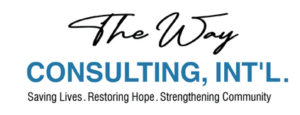About The Way Consulting Int'l.
Saving lives, restoring hope, and strengthening community through effective suicide prevention programs is our sole focus, and we know the best of science and practice to achieve these results.
If you are concerned about suicide in your faith community organization, or school setting, then you have come to the right place. The Way Consulting Int’l. is a non-profit organization dedicated to promoting a comprehensive, evidence-informed health approach to preventing suicide. Our team embraces the reality that to save lives, restore hope, and strengthen communities; we must thoroughly understand and address the spectrum of needs and the many factors that can affect suicide risk and address them with activities that work.
Past efforts have demonstrated that single or isolated efforts in and of themselves will likely not reduce suicide. In addressing suicide, focusing on one risk or one protective factor for suicide, without understanding the many challenges that may exist at multiple levels or the variety of resources available to address these challenges, is a misapplied or even a futile effort. Because suicide is complex, our response needs to be comprehensive, targeted, and evidence-informed. We must take a “bundled” approach and apply multiple activities to achieve desired outcomes.
Additionally, it is essential to take a life-span approach as the risks and protections for youth and young adults may differ from those of middle-aged and older adults. Risks and protections may also differ among certain groups such as veterans, indigenous individuals, and underserved, at-risk communities. The Way Consulting Int’l. recognizes the challenge, is aware of the evidence that must apply, and knows how to intervene with intention and precision to achieve results. It’s time to re-think how we engage as past approaches have not yielded desired results. Saving lives, restoring hope, and strengthening community through effective suicide prevention programs is our sole focus, and we embrace the best of science and practice to achieve these results.
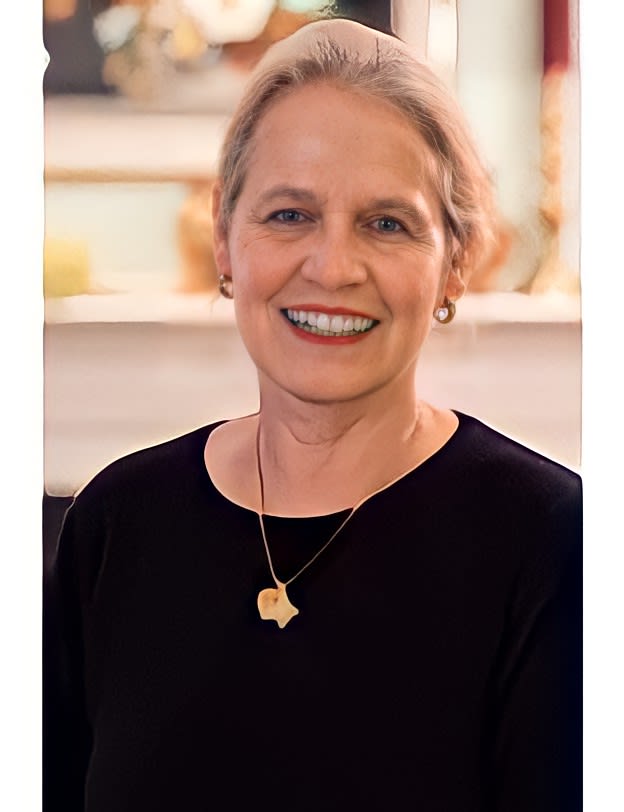
Anne Mathews-Younes
President,
E. Stanley Jones Foundation
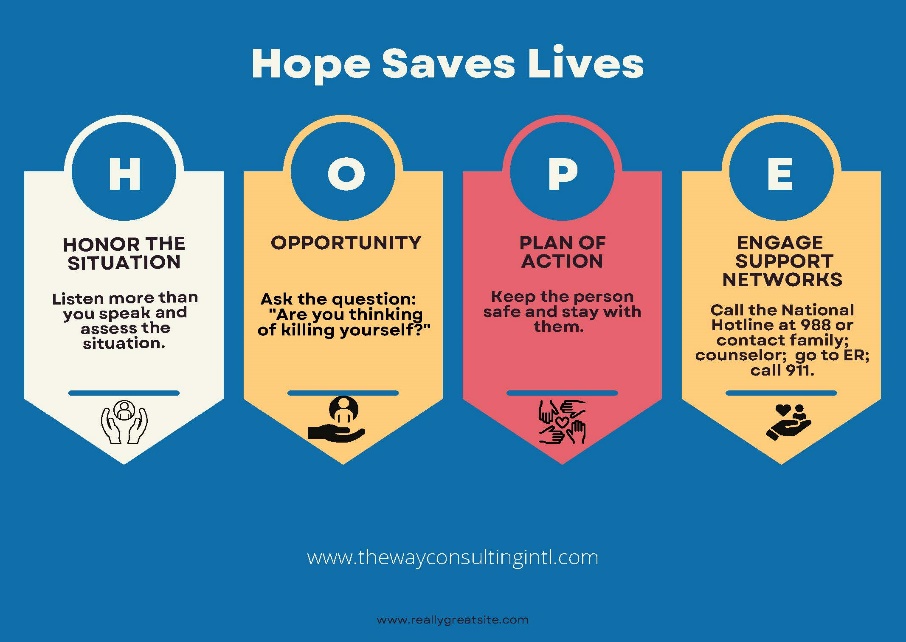
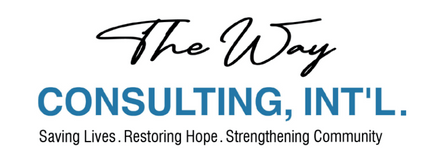
Our Legacy in Support of
Mental Wellness
The E. Stanley Jones Foundation (ESJF), a 501(c)(3) non-profit organization, has more than two decades of charitable service. Its subdivision, The Way Consulting Int’l. (TWCI) exists to save lives and ease emotional pain by bringing evidence-informed training and practices in mental health and suicide prevention to public, private, and faith-based organizations, such that our engagement serves as a catalyst to transform organizational behavior and improve lives.
The Way Consulting, Int’l advances holistic emotional wellness and suicide prevention through offering consultation and training services that save lives, restore hope, and strengthen community. Our effective suicide prevention programs combine the best of science and practice to achieve results and are implemented by our international and interdisciplinary team of subject matter experts in mental health and suicide prevention.
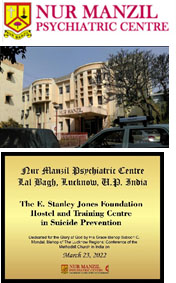
The ESJF’s legacy of supporting emotional health and wellbeing runs deep. Dr. E. Stanley Jones, grandfather of Anne Mathews-Younes, Foundation President, experienced stress, and mental suffering in the course of his work as a global missionary. This personal experience inspired Dr. Jones to take up the cause of persons with emotional illness and their families. He envisioned a place in India where people with emotional and mental health needs could find treatment in a holistic setting that addressed mind, body, and spirit. Jones met frequently with Dr. Karl Menninger, the world-famous Psychoanalyst, and Dr. Dagmar Norell, a Swedish Psychiatrist at the Menninger Institute. Both worked with Jones to help establish a psychiatric center in Luck now, India, The Nur Manzil (Palace of Light) Psychiatric Centre officially opened on December 13, 1950. Nur Manzil continues to pioneer in the field of psychiatry as a charitable institution offering its unique services to the society at large without any discrimination because of religion, gender, social or economic status.
Why We Do What We Do
Suicide rates increased approximately 36% between 2000–2021. Suicide was responsible for 48,183 deaths in 2021. That is a shocking one death by suicide every eleven minutes. The number of people who think about or attempt suicide is even higher. In 2021, an estimated 12.3 million American adults seriously thought about suicide, 3.5 million planned a suicide attempt, and 1.7 million attempted suicide. Suicide affects people of all ages. In 2021, suicide was the second leading cause of death for people ages 10-14 and 20-34. Suicide was among the top 9 leading causes of death for people ages 10-64. (Centers for Disease Control and Prevention Suicide Facts) Each year more people die by suicide than from HIV, malaria, breast cancer, or from war and homicide, according to the World Health Organization (WHO).
A common question we often hear: “What causes suicide?”
Imagine there is a glass in the sink beneath a slowly dripping tap. Ever so gradually the droplets fall and fill the glass– little by little –until a single drop falls, and the glass suddenly overflows. The overflow is caused by the accumulation of thousands of drops of water not just one—
This illustration helps us understand that suicide has no single cause.
But there is good news. Many suicides are preventable. We want to be part of the solution.
“The experience of helping a fellow person in danger, or even of training in a realistic manner to be ready to give this help, tends to change the balance of power in a youth’s inner life with the result that compassion can become the master motive.”
Kurt Hahn
The Cornerstone of a Caring Culture -
Kurt Hahn who was a German educator and founder of the United World College spoke that his favorite story was the story of the Good Samaritan. In his view, it is a clear example how people who were in a position of strength to help someone in need, failed to act. It is a surprising example of how an outsider–a weaker, despised Samaritan who seeing the person in need, offered help, and in so doing, taught us what it means to be a civilized human being. Encountering this Parable of the Good Samaritan, became the passion of Hahn’s life. It focused his life’s work to help as many people as possible to fulfill their own promise, to be the best they can be, and to live with courage, compassion, and love, following the example of the Good Samaritan. This parable poses very important transformative questions for us today, questions that can serve to ensure a caring culture/community for all:
How can we live a life of ensuring significance?
Who am I, and who is my neighbor?
It was the Samaritan in the parable who helped a person in need, not because it was his job, or to seek recognition or because the person in need was from his country or ethnic group, but because The Samaritan understood that everyone was his neighbor, no one was a stranger.
Our attitudes toward one another do not depend upon who they are but upon who we are. Our neighbors are everywhere and wherever there is need, wherever our minds reach, wherever our skills can be used, that is our neighborhood. That fact is the cornerstone of a caring culture.
The Way Consulting Int’l. team subscribes fully to the concept that suicide prevention, the promotion of health and well-being, and the establishment of a caring, compassionate, and loving environment belong to all of us. When you combine that caring, compassionate and loving spirit with data, evidence and results, lives can and will be saved.
Hahn’s proposal for a loosely federated Corps of Helpers could contribute to creating a deep and sustaining culture of caring. According to Hahn, it is critical to let individuals know that they are “needed.” Neither a proclamation nor persuasion inspires people or engenders hope. But a sense of purpose and engagement in service to others is transformational.
Embracing changes and developments in psychiatry, Nur Manzil is a learning and training environment for renowned mental health professionals from the world over to practice their art. Many distinguished psychiatrists from Sweden, Switzerland, U.S.A., Britain, and Australia have contributed greatly to the development of Nur Manzil, which is now under the full-time leadership of Indian physicians and offers a full range of mental health professionals. Through The Way Consulting Int’l., the E. Stanley Jones Foundation recently set up a training center in suicide prevention at Nur Manzil, where mental health awareness and suicide prevention training is provided for more than 2500 student nurses annually. These certified nurse’s take their suicide prevention skills to mental health service systems serving people across India.
